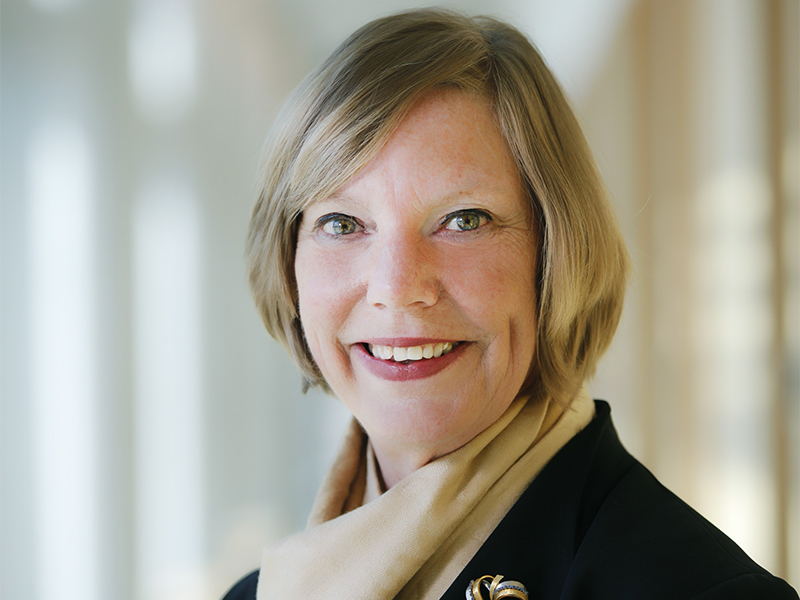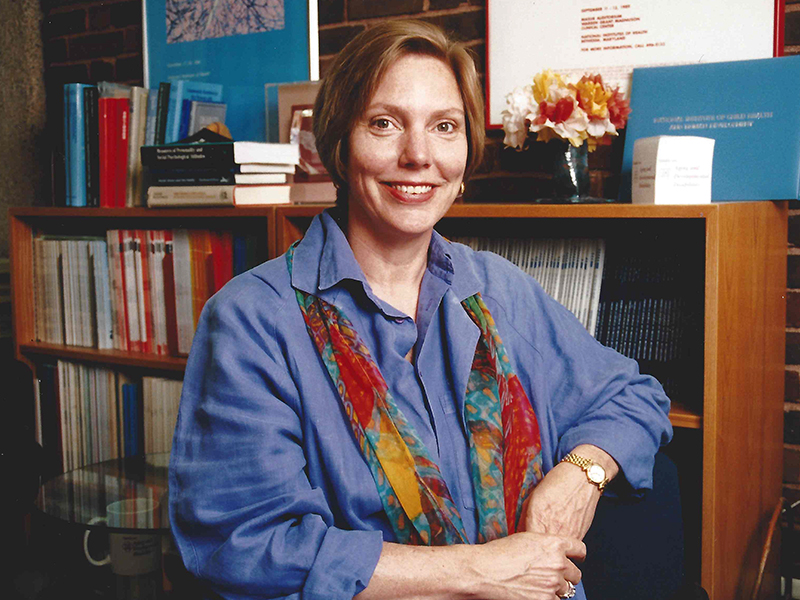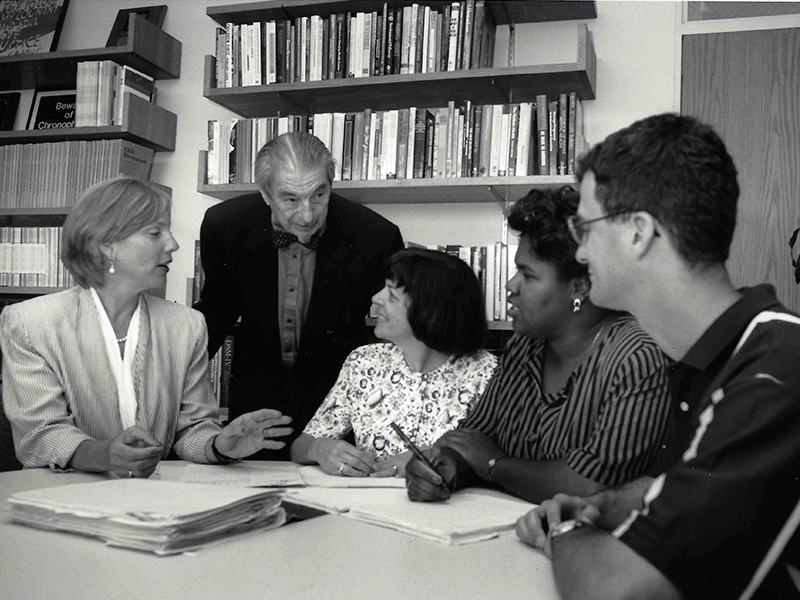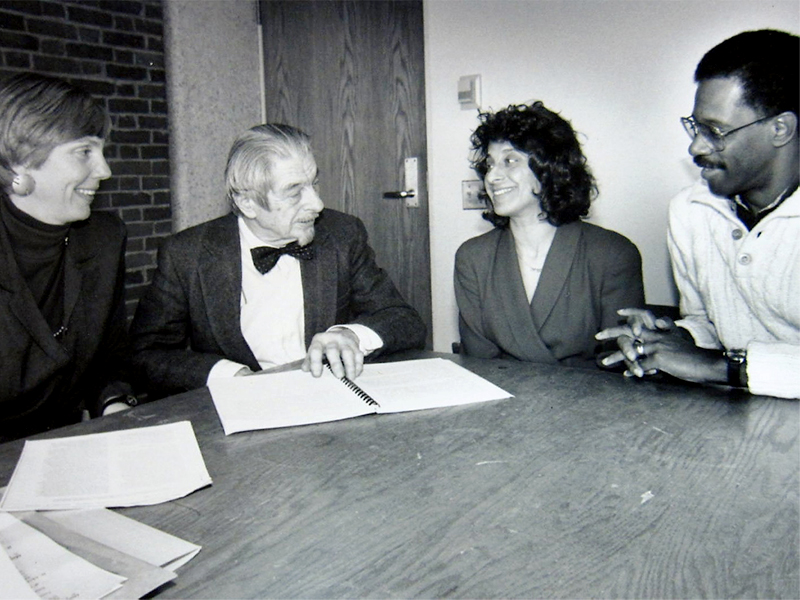Professor emerita and former university provost, Marty Wyngaarden Krauss, PhD’81, passed away the evening of January 12. A Brandeis lifer, Krauss completed her doctoral studies at the Heller School, then joined the faculty in 1984 and spent her entire academic career at Brandeis. Over nearly 35 years she built a distinguished career as a disability policy researcher and faculty member, and took on multiple key leadership positions at the Heller School and the university.
First as a student and later as a junior faculty member, Krauss was mentored by the late Professor Gunnar Dybwad, a renowned champion for the civil rights of people with intellectual and developmental disabilities. With the guidance and support of Dybwad and others, Krauss became a respected and innovative researcher whose work helped put the Heller School on the map as an important place for disability policy research. </p/>
As a scholar, Krauss' research focused on the social and familial impacts of developmental disabilities. She and her colleagues carried out the longest-running study of children with disabilities and their families, following a sample of infants and toddlers to young adulthood. Her approach to the family environment, including a focus on fathers, was considered eye-opening at a time when similar research only considered the role of mothers. Krauss and colleagues also studied the lives of older adults with disabilities and the families who cared for them, at a time when most disability research focused solely on children. Research colleagues highlighted Krauss' direct engagement and commitment to those she studied and their families, describing her scholarship as “rigorous, impactful, and personal.”
As a Heller faculty member, Krauss became John Stein Professor of Disability Research and director of the school’s Nathan and Toby Starr Center on Intellectual and Developmental Disabilities. In addition to conducting research herself, Krauss shared her research skills with PhD students through her course on survey methods (a critical component of Heller’s doctoral program) which she taught for many years.
She later served as Heller’s associate dean for faculty and academic programs, and was instrumental in establishing the Lurie Institute for Disability Policy at Heller in 2007. “Her efforts continue to influence our work daily,” says Lurie Institute Director Monika Mitra. “Not only was she an eminent scholar, she was also a tireless advocate for people with intellectual and developmental disabilities. Her passing is a monumental loss to the intellectual disability research community and beyond.”
Krauss received many awards and honors for her work, including the Joseph P. Kennedy, Jr. Foundation International Award for Leadership, and the Christian Pueschel Memorial Research Award of the National Down Syndrome Congress. She also chaired the Massachusetts’ Governor’s Commission on Intellectual Disability from 1993-1999 and served on the board of directors of Special Olympics International from 1992-2002.
In 2003, Krauss left Heller to become the university’s provost and senior vice president of academic affairs, a position she held for eight years. In that role, she oversaw several critical projects, including the university’s 2006 reaccreditation, recruitment of former deans Lisa Lynch (Heller) and Bruce Magid (IBS), and the launch of the Office of Global Affairs. She was also instrumental in supporting highly collaborative academic projects such as establishing the undergraduate HSSP and business majors and the Eli J. & Phyllis N. Segal Citizen Leadership Program.
Even after she retired in 2012, Krauss remained engaged with the university. She served as honorary chair of the Heller School’s 55th anniversary celebration in 2014, where she received an alumni service award. Shortly thereafter, Krauss left her retirement to serve as Heller’s interim dean from 2014-2017. During that time, she was deeply involved in supporting the development of Our Generation Speaks, a unique fellowship program and incubator for Israeli and Palestinian leaders, hosted at the Heller School.
“Her willingness to come out of retirement and serve as interim dean at Heller reflected her commitment to Brandeis in general, and to Heller more specifically,” notes Lisa Lynch. After her interim deanship, Krauss served as an emerita member of Heller’s board of advisors.
Those who worked with Krauss remember her as an inspiring teacher and mentor, and as a consummate researcher whose dedication to civil rights for people with disabilities was unparalleled. Above all, many have noted her as a kind person and a good friend, who gave so much to Heller and to Brandeis over the years.
Condolences and Tributes
A full obituary and forum to leave digital memories and tributes for Marty Krauss is available here. Condolence notes can also be mailed to Marty's husband, Richard Krauss, at: 1010 Memorial Drive, Cambridge, MA 02138.
![]()




